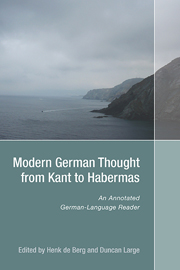Book contents
- Frontmatter
- Contents
- Acknowledgments
- Introduction: German Thought since Kant
- 1 Immanuel Kant (1724–1804)
- 2 Georg Wilhelm Friedrich Hegel (1770–1831)
- 3 Ludwig Feuerbach (1804–72)
- 4 Arthur Schopenhauer (1788–1860)
- 5 Karl Marx (1818–83)
- 6 Friedrich Nietzsche (1844–1900)
- 7 Sigmund Freud (1856–1939)
- 8 Martin Heidegger (1889–1976)
- 9 Walter Benjamin (1892–1940)
- 10 Georg Lukács (1885–1971)
- 11 Max Horkheimer (1895–1973) and Theodor W. Adorno (1903–69)
- 12 Jürgen Habermas (b. 1929)
- Index
- About the Editors
5 - Karl Marx (1818–83)
Published online by Cambridge University Press: 05 September 2014
- Frontmatter
- Contents
- Acknowledgments
- Introduction: German Thought since Kant
- 1 Immanuel Kant (1724–1804)
- 2 Georg Wilhelm Friedrich Hegel (1770–1831)
- 3 Ludwig Feuerbach (1804–72)
- 4 Arthur Schopenhauer (1788–1860)
- 5 Karl Marx (1818–83)
- 6 Friedrich Nietzsche (1844–1900)
- 7 Sigmund Freud (1856–1939)
- 8 Martin Heidegger (1889–1976)
- 9 Walter Benjamin (1892–1940)
- 10 Georg Lukács (1885–1971)
- 11 Max Horkheimer (1895–1973) and Theodor W. Adorno (1903–69)
- 12 Jürgen Habermas (b. 1929)
- Index
- About the Editors
Summary
Life and Work
Karl Marx was born in the historic Rhineland city of Trier in 1818, into a middle-class Jewish family. From 1835 until 1841 he studied a rather eclectic variety of subjects, including law and philosophy, at Bonn and Berlin before obtaining his doctorate from the University of Jena with a comparative study of the Greek philosophers Democritus and Epicurus. During these years, he was heavily influenced by the Young Hegelians, a group of left-wing intellectuals who used what they considered the progressive elements in Hegel's philosophy to move beyond that philosophy with its seemingly conservative implications into various forms of political and religious criticism. In 1842, Marx started working as a journalist for the Rheinische Zeitung, only to resign a year later, exasperated by the Prussian censorship regime. Shortly afterwards, he accepted the offer to edit a new journal, the Deutsch-Französische Jahrbücher, in Paris — a position that not only provided him with a platform for his ideas but also enabled him to marry his fiancée, Jenny von Westphalen.
Paris was home to a large number of German political refugees, so prospects seemed good for a magazine aiming to bring about a left-wing Franco- German intellectual alliance. No French thinker or writer, however, was willing to contribute to the Jahrbücher. More importantly, Marx quickly fell out with his co-editor, the Young Hegelian Arnold Ruge. This was due not just to personal animosity, but also to philosophical and political differences. By now, Marx was progressively moving away from his Young Hegelian roots and beginning to arrive at a theory that located the main source of social injustice not in specific political structures or inhumane ideologies, but in economic antagonisms.
- Type
- Chapter
- Information
- Modern German Thought from Kant to HabermasAn Annotated German-Language Reader, pp. 123 - 158Publisher: Boydell & BrewerPrint publication year: 2012



